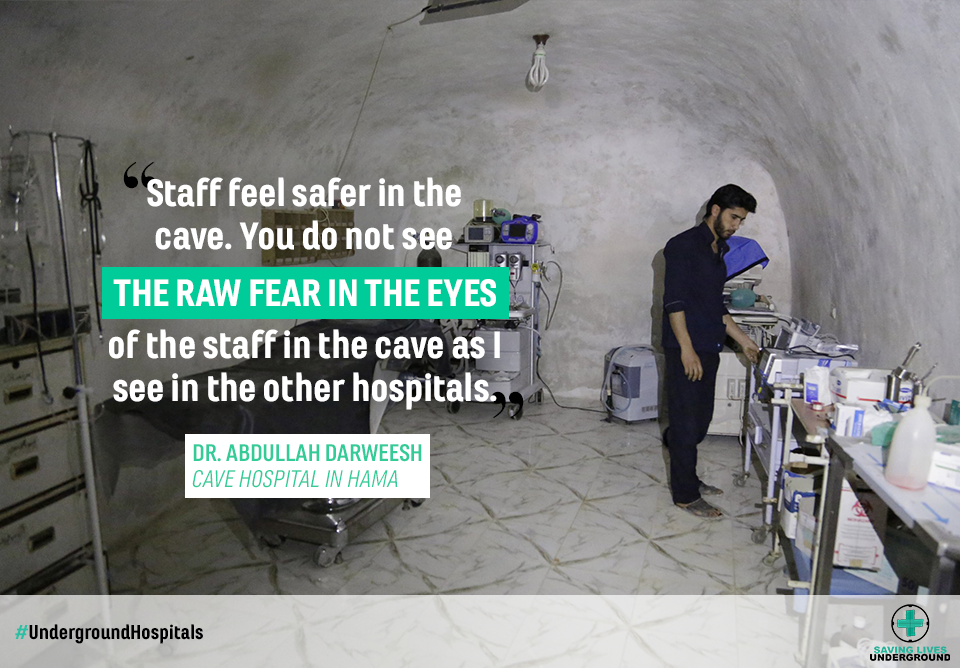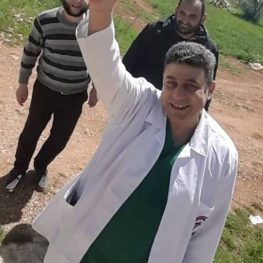For Immediate Release
May 11, 2017
Washington, D.C.- SAMS joins The Syria Campaign and 12 other Syrian medical organizations today in calling on donor governments to begin funding the construction and fortification of underground hospitals in Syria, following the heightened attacks on medical facilities last month.
A new report, entitled Saving Lives Underground, released today by SAMS, The Syria Campaign and 12 other leading Syrian medical organizations, explains how fortifying hospitals is one of the most effective ways of protecting Syrian medics, calling on donor governments to allocate funding for these hospitals. Underground and fortified facilities act as crucial lifelines, saving patients, preserving donor-funded equipment, and providing a sense of security for health workers, preventing further displacement.

Last month was a particularly deadly month for health care in Syria: there were 25 attacks on medical facilities – an average of one attack every 29 hours. Since the start of the conflict, at least 814 health workers have been killed in 454 attacks on health facilities. Syrian health workers and patients urgently need support from the international community for protective measures.
SAMS’s Dr. Farida, the last OB/GYN to remain in East Aleppo until the forced displacement of the city, said: “The only way to protect medical staff is under the ground. There is no other way. Other than to stop the airstrikes on hospitals.”

The report highlights five key findings illustrating both the scope of need and effectiveness of underground facilities:
- Underground hospitals are much safer, proven to protect medical staff compared to above-ground facilities.
- Fortification and underground construction represents the #1 donor demand of Syrian health workers.
- Three major models of underground hospitals have been developed – basement hospitals, cave hospitals, and fully underground hospitals.
- The need for protection is immense; 50% of hospitals outside of government-held areas in Syria have no measure of reinforcement or fortification.
- Protection is cost effective; it costs only $719,000 to fortify the existing priority facilities identified as priorities in the Idlib governorate.
 The report is dedicated to Dr. Hasan Al-Araj, a health care pioneer and cardiologist who envisioned the Central Cave Hospital in Hama and spearheaded its construction. This hospital has protected the lives of countless medical staff and patients. On April 13, 2016, Dr. Hasan was killed outside of his hospital when the ambulance he was driving was targeted by an airstrike.
The report is dedicated to Dr. Hasan Al-Araj, a health care pioneer and cardiologist who envisioned the Central Cave Hospital in Hama and spearheaded its construction. This hospital has protected the lives of countless medical staff and patients. On April 13, 2016, Dr. Hasan was killed outside of his hospital when the ambulance he was driving was targeted by an airstrike.
“Over the past six years, we have witnessed the resilience of Syrian health care providers. They have adapted and innovated in response to the unprecedented scale of attacks against healthcare in Syria,” Dr. Ahmad Tarakji, SAMS President, said.
“The fortification and creation of underground hospitals has proven to be the only solution to protect the very few remaining healthcare workers in Syria and is a testament to their ingenuity and their determination to provide care – ideals that were embodied by our dear colleague, Dr. Hasan Al-Araj, the founder of the cave hospital in Hama,” Dr. Tarakji continued.
SAMS and the signatories to the newly released report emphasize that the only way to truly protect medics and patients is to end aerial attacks against health and civilian infrastructure. Until this is achieved, donor branches of governments should prioritize supporting these underground and fortified facilities, to allow medical organizations to offer even the most minimal protection measures.
“I have personally witnessed the construction and operation of these lifesaving facilities and their impact on the way that health workers and patients feel providing and receiving care. It is critical that the creation of these facilities is supported by donor governments in order to continue protecting our medical staff and patients.” said SAMS’s board member and past chairman Dr. Amjad Rass.
For media requests, please contact our Media and Communications Manager, Lobna Hassairi at lobna.hassairi@sams-usa.net.

